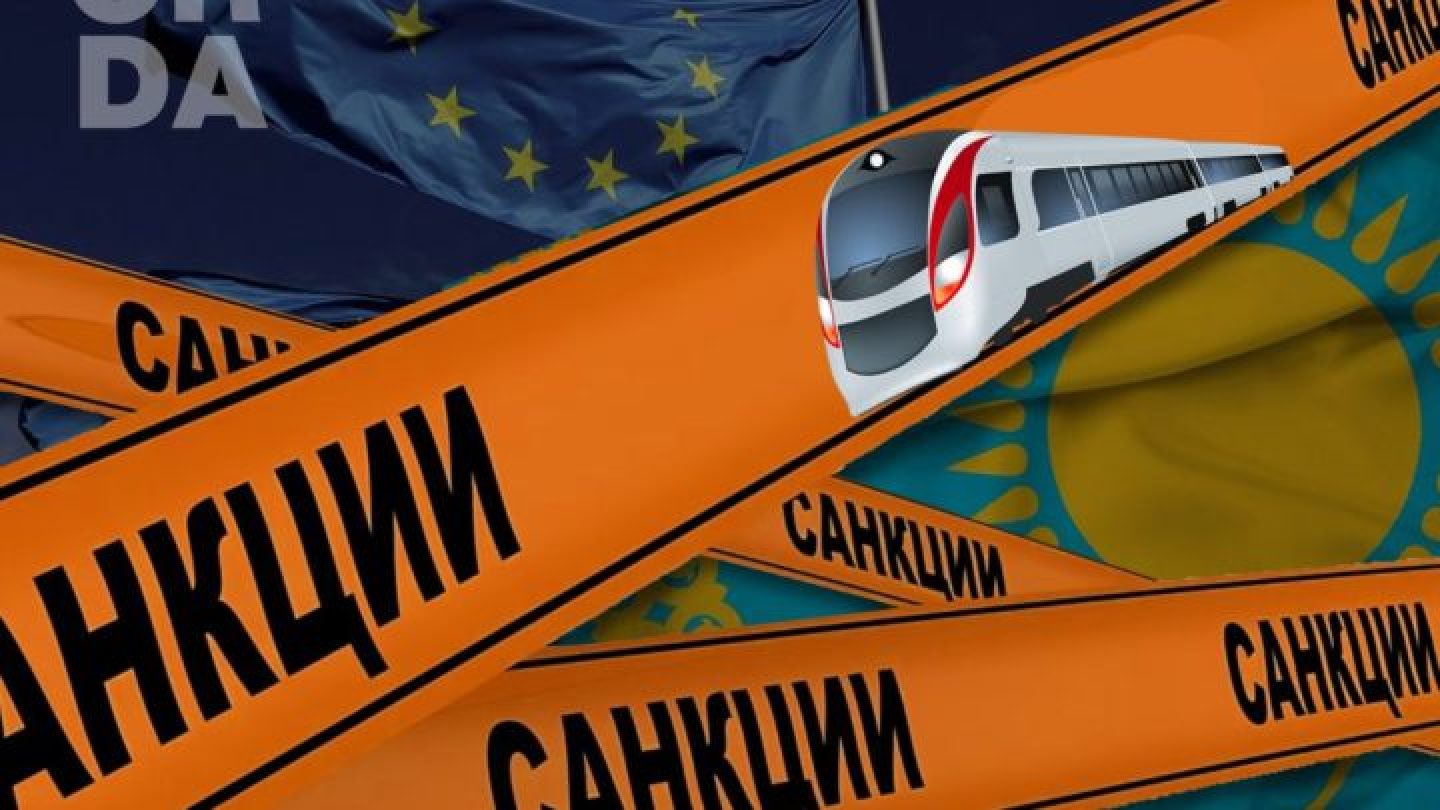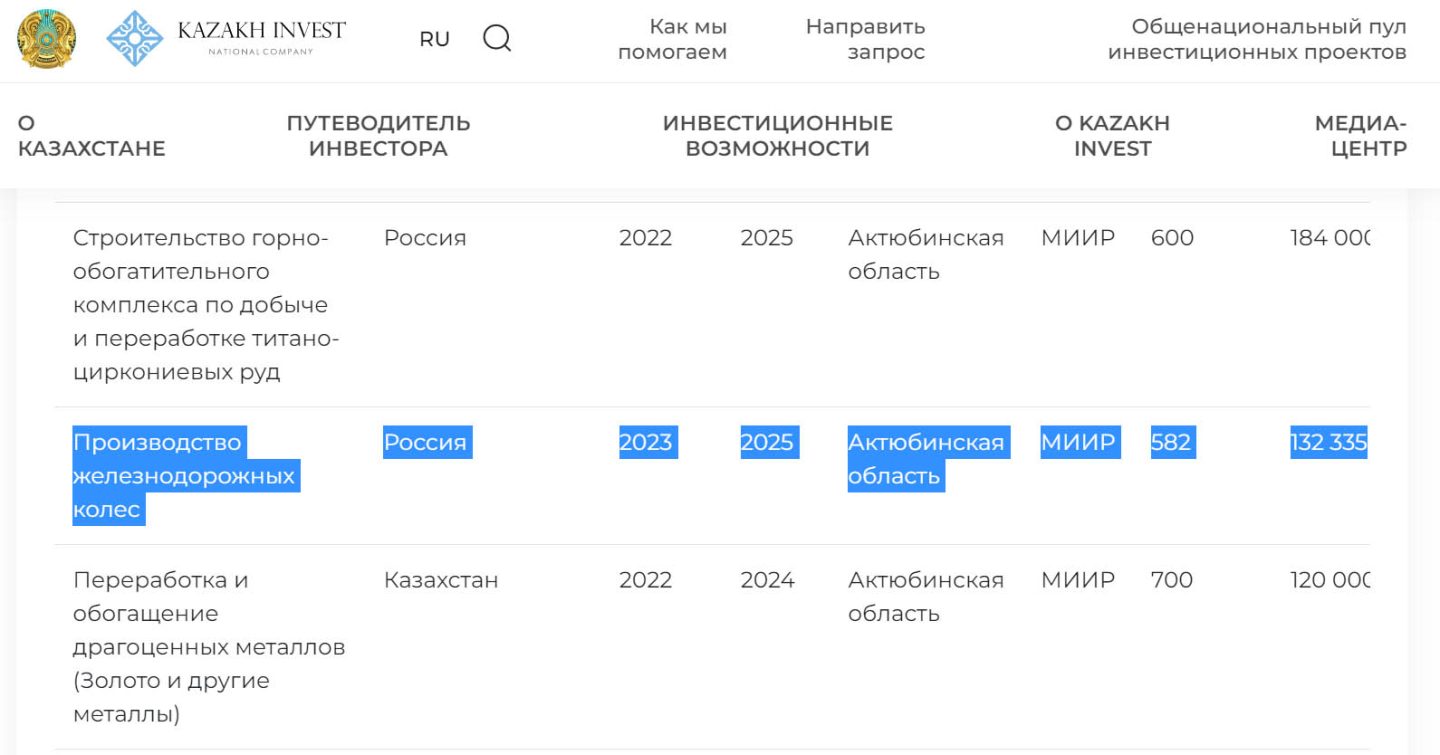Czech Republic Follows Kazakhstan's Lead

A heavy machinery plant will be built in Aktobe with the money of Russian oligarchs. Prior to February 24, 2022, this news would have been viewed positively. But after Russia launched their war against Ukraine, almost all of the country's industry came under sanctions. As a means of circumventing them, Russian elites began to use Kazakhstan and other EAEU countries. Now they themselves risk falling under secondary sanctions. Orda wrote about this transaction in more detail in February, but the story is gradually gaining new details and flags on the map.
Akim of Aktobe region, Yeraly Tugzhanov, signed a memorandum on the construction of a plant for the production of railway wheels.
Aktobestil LLP, which opened in October 2022, plans to start construction of this plant in early 2023. Denis Safin, a Russian oligarch originally from Temirtau, Kazakhstan, is behind the LLP. He also owns the Zagorsk Pipe Plant and the Ural Steel enterprise. Safin himself and his enterprises were included in the sanctions lists of the European Union.
Later, the German Federal Office of Economics and Export Control (BAFA) took interest in the situation.
We made a request to the Akimat of the Aktobe region for clarification. It was important to find out whether the regional authorities analyze incoming investments and how they assess risks.
But they decided to ignore almost all our questions and sent a text of the press release as an answer. The local authorities did not confirm, but also did not deny the Russian origin of the investment. However, we found this information on the website of JSC NC "KAZAKH INVEST". The project for the production of a railway cluster is available in the nationwide pool of investment projects.

Editorial board of Orda.kz has sent a new request to the regional administration.
The regional akimat spoke about what stage the project is now.
"Currently, the project is in the pre-investment stage, design and estimate documentation is being developed, issues of plant construction with contractors, supply of technological equipment are being worked out. A land plot is being determined with subsequent provision as a full-scale grant under an investment contract, work is underway to include the project in a Single industrialization Map,"
the report says.
The Czech Republic
Meanwhile, the Czech Republic has demonstrated interest in the deal. Local media published an article with the ironic headline "The Czech Republic Follows Kazakhstan's Example."
The article says that the Czech Republic, like Kazakhstan, is becoming a platform for Russian oligarchs to circumvent sanctions. It turned out that the Czech machine-building metallurgical giant ŽĎAS is close to signing a major contract with the Russian OJSC Zagorsky Pipe Plant (ZTZ). It belongs to the same Denis Safin, who is behind Aktobestil LLP.
At the end of last year, major German suppliers cut off negotiations with ZTZ on the supply of equipment due to the risks of secondary sanctions. The Russians then turned to the Czech company with a similar request. ŽĎAS has long-term and fruitful business relations with Russian metallurgical companies.
The author of the material expresses fears that the Kazakhstani enterprise will deliberately go bankrupt after receiving European equipment.
"After receiving the European equipment and technologies under sanctions, the project may be declared bankrupt. Or suddenly it turns out that the project is not economically feasible. The equipment is already in Kazakhstan, belongs to the Kazakhstani side and can be freely and uncontrollably transported to Russia, thereby avoiding sanctions,"
the article says.
Tightening of Sanctions
Previously, assistance in circumventing sanctions meant European private companies could face administrative responsibility. But the EU has been criminalizing such violations by law since 2022.
On November 28, 2022, the EU Council decided to include circumvention or violation of European sanctions in the list of criminal offences.
In particular, the European Commission proposed to impose a penalty of five years in prison for individuals and a fine of 5% of the annual turnover for companies for circumventing sanctions. Now, this directive must be approved by the EU Council and the European Parliament. Once approved, the decision will become binding on all EU members.
Kazakhstan is not a member of the European Union, but this makes the republic even more convenient for circumvention of sanctions. Especially if local authorities turn a blind eye to the origin of investments.
In March 2022, the European Union banned the import of rolled steel, rebar, welded and seamless pipes from Russia. These sanctions affected the export of 3.9 million tons of finished metal products, 200,000 tons of pipe products and 700,000 tons of steel billets, which in monetary terms is approximately 3.7 billion dollars. This led to a decrease in steel production in the Russian Federation. According to the World Steel Association, in the period from January to August 2022, 48.9 million tons of steel were produced in Russia, which is 5.8% less than in the same period last year. The Ministry of Industry and Trade of Russia predicts a decrease of 6-8% by the end of the year.
Original Author: Ilya Astakhov
DISCLAIMER: This is a translated piece. The text has been modified, the content is the same. Please refer to the original article in Russian for accuracy.
Latest news
- Timur Kulibayev vs. New Kazakhstan: Oligarch Defends His Assets
- MP supported Imam's Statements About Kazakh Traditions
- Altyn Adam: How Filmmakers Quarreled Over Cartoon About Scythian Warrior
- "No Chance": Russian Deserters' Stories in Kazakhstan
- National Fund Earns As Much As It Spends
- What is Going on with FPL Head's Recent Appointment?
- Stati Case: Victory for Kazakhstan?
- Qataris to Spend $3.5 Billion on Construction of Plants in Kashagan
- Oil Quotas: a Blessing or a Curse for Kazakhstan?
- Plant in Kazakhstan: Swiss Investor Purchased, Legal Battle Follows
- Situation with Russian Securities in Kazakhstan Explained
- Uranium Mining Tax in Kazakhstan to Change Starting in 2025
- Chinese Oil Giant to Build Wind Farm in Kazakhstan
- Expert Explains Toqayev Greeting Xi Jinping in Particular Way
- Scandal around "Aria-Zhana Astana", Controlled by Satybaldy, Not Subsiding
- SCO Summit in Astana: What to Expect?
- Who Was Oppositionist Aidos Sadykov?
- KNB Agent Orik VS Financial Police Agent Sanych
- Nazarbayev's Relatives on Trial: Systemic Purge or Political Games?
- Fire in Greece: Luxury Yacht, Kazakhstani Oligarchs' Vacation Scandal

